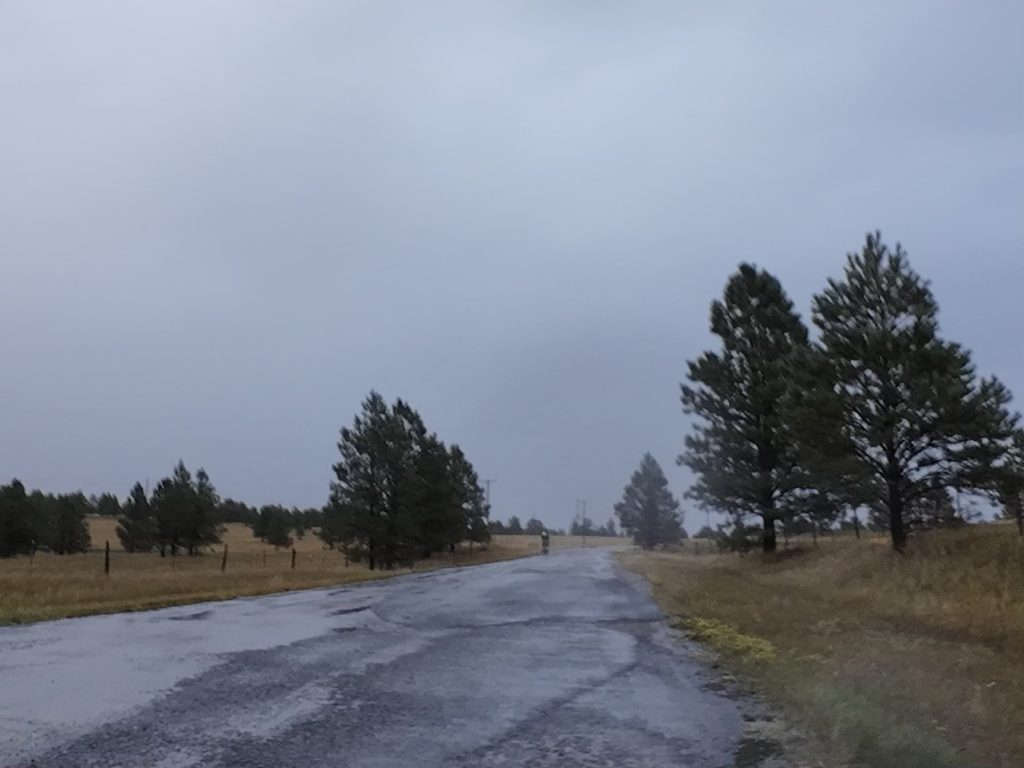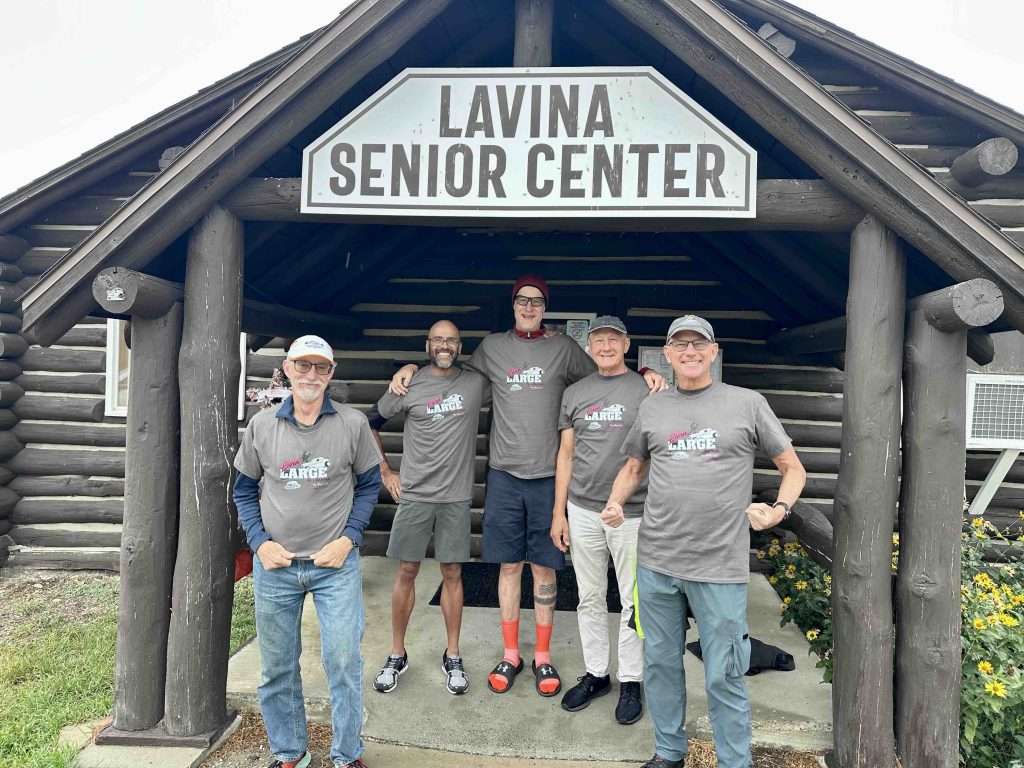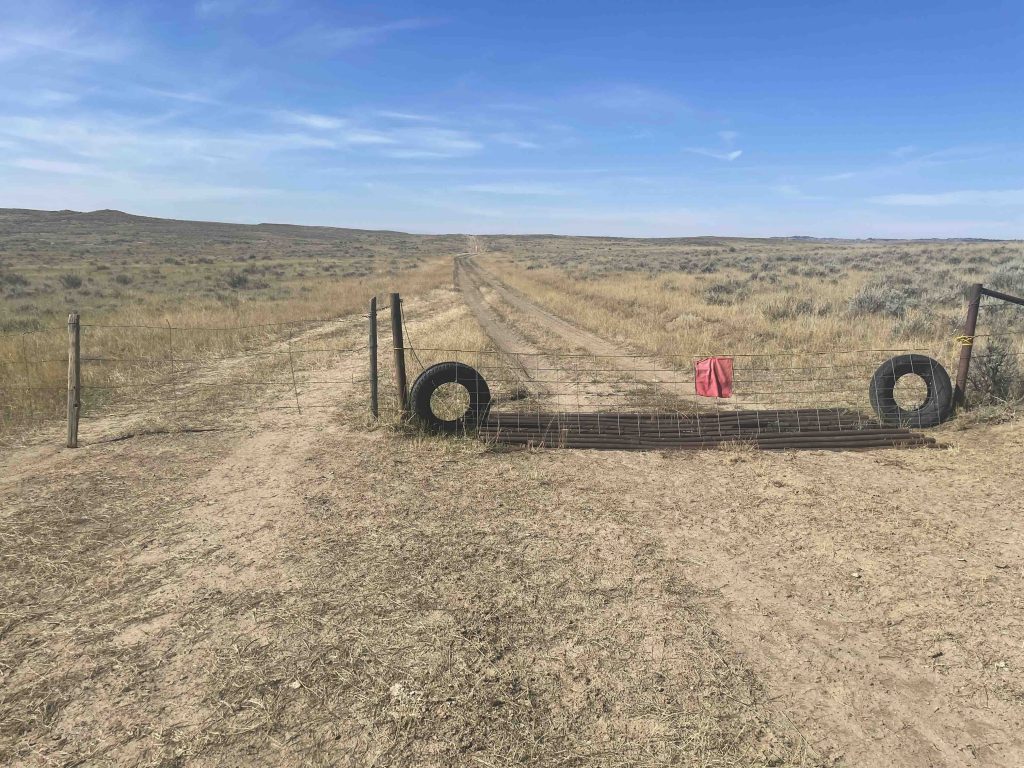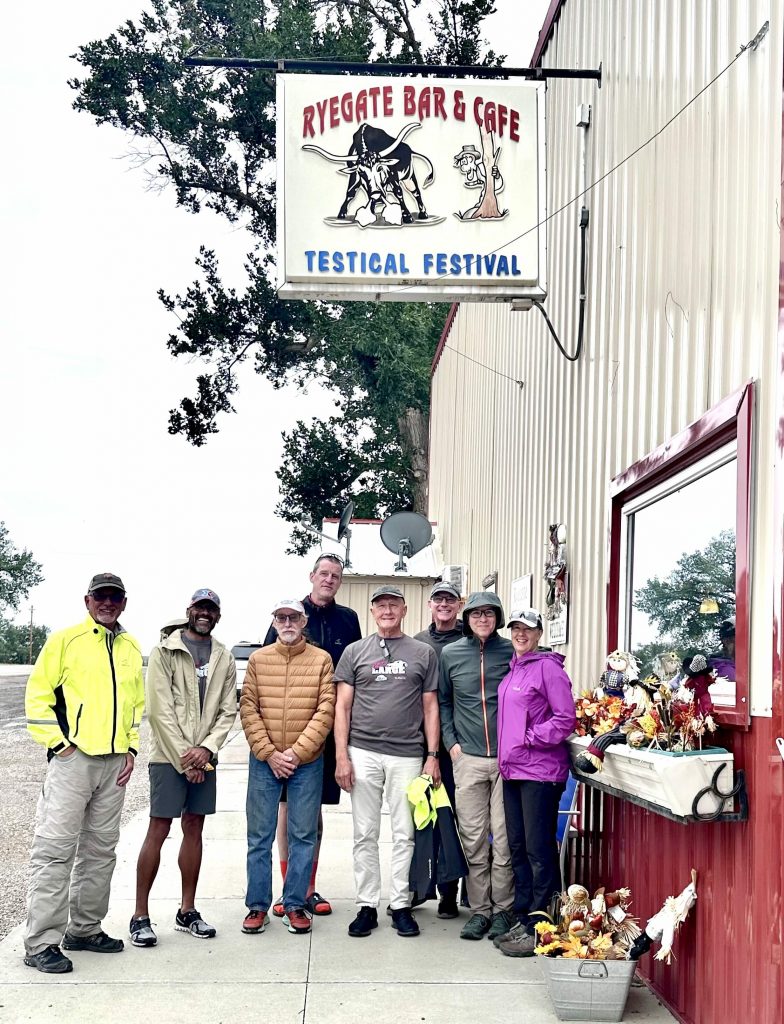Roundup to Harlowton

“Maybe they have rain pants here,” Satish said. He’d already struck out at the Roundup Hardware and Ranch store. Despite the forecast of two inches of rain, 25 to 40 mile per hour headwinds, and wind chills in the upper 40s, he and Robin planned to start out “just to see what it’s like” the next morning.
The first leg of our planned five-day, 324-mile gravel ride through central Montana had exceeded everyone’s expectations. After a one hour warm-up on Alkali Creek, a quiet road into the ranch-lands north of Billings, the day quickly warmed as the surface turned to gravel and dirt. Lunch among the pines at 40 miles was followed by a 15 mile downhill to the final 6 miles on US 12 into Roundup.
A little before 6 PM, we aimed for the Backporch Barbeque a mile down Main Street from the Autumn’s Inn, where we took up half the rooms. The clear skies we’d had during our ride had turned grey, and the building clouds and wind from the west confirmed what reports had ominously been warning us of for the past two days – unfriendly conditions for our planned 82 miles cycling on hilly dirt roads.
“Why do you think it’s a good idea to ride tomorrow?” I asked Robin.
Through a half-smile, he answered, “Well, I’m trying to get ready for a 350-mile ultra-ride in a few weeks, back in Washington.”
“There’s no support on that?”
With a dry chuckle, he said, “No…I carry everything. Pull off and sleep whenever. I figure I have to practice for all conditions?”
“Challenging” means different things to different people”, I thought.
Satish exited the Bell Mountain Trading post, proudly waving a pair of black nylon overpants. “They just opened – still putting price tags on things! Only six dollars!” he crowed.
“Think they’ll actually keep you dry?” I asked.
“I doubt it.”
“Well, I learned commuting in the rain, you can either be cold and wet, or you can be warm and wet.”
“Warm is what I’m hoping for.”
The crowd inside the Backporch eyed the nine of us as we entered the only dining option in town. A blackboard listed the night’s special: “2 Chicken Enchiladas”. After filling up a table and a booth, most of us opted for the special.
During the interminable wait for a meals (“what are they doing, killing the chickens now?” “At least they’ll be fresh…”) we discussed that day’s events and plans for the next.
I asked how the ride had gone. Tom offered, “I could keep up with Jonnie and Robin for maybe an hour. But I didn’t want to lose them, so I worked harder than I should have.”
“You don’t have to go any faster than you can hold for the whole day. We’ve got a sag wagon – two, actually – so if we split into two groups, it’s OK, I think. Go your own pace.”
That night, I woke up at midnight, and pulled the curtains to look out on rapidly forming puddles in the parking lot. The day’s dust and been washed off the van, leaving a rectangular mound of mud beneath it. Rain pelted my basement window in waves. I went back to bed, but couldn’t sleep. My job on this trip was to provide support services to the other eight riders. I had scouted the route the year before, and knew that, even without the promised miserable weather, Day Two would be rough. Eight-six miles until the next motel, starting with a saw-tooth profile on a rugged dirt road. After a few miles on pavement, back to an even sketchier track, which had ruts up to a foot deep as it climbed a hill to the treeless ranch land on a shelf above the Musselshell River. The payoff would be a herd of pronghorn antelope before the descent back to pavement into Harlowton.
Despite the absurdly low price for some of the rooms ($50 a night), and the eclectic nature of the furnishings, the Autumn’s Inn Motel provided the best breakfast we had on the whole trip. Eggs and bacon and biscuits freshly cooked, along with the usual cold cereal, toast, and coffee. We’d agreed to meet at 7 AM to finalize plans for the day.
The rain was, if anything, coming even harder when I walked the twenty feet outside from my room to the breakfast loft. Up there, Robin was standing, dressed in everything he had brought, talking to a group of men seated at the main table, smiling at him as they nursed their morning coffee.
“These guys have all the local knowledge,” Robin said.
“You really going out in this?” I asked.
“We tried to tell him, but, you know, you can’t fix stupid,” said a guy in a flannel jacket, capacious jeans, and a worn ball cap.
“Let me know before you go. I’m not going to follow you in the van. I’ll drive to Lavina, wait for you there?” I said.
“When are you all going to leave?” Robin asked.
“Well, I think everyone else isn’t riding. We’re going to kill as much time here as we can. We don’t have to leave until 11.”
“So, if I get 10 miles in and turn around, you’ll still be here?”
“OK, if you’re not here by 10:30, we can assume we’ll see you in Lavina…”
Robin noted, “You’ve got me on ‘Find my’ on your phone, and Michele can follow me on her Garmin Reach, so it ought to be OK.”
The group at the table chuckled as Robin left. “Is he a democrat or a republican?” one of them asked.
I certainly didn’t want to get into a political discussion in a small town in Montana. I searched desperately for a way to defuse that. “I think he must be having what I call a ‘Biden moment’.”
“Yeah, he seemed a little confused about the weather outside. Nobody’s goin’ anywhere this morning. I work for the county, supposed to be on those roads now, and I’m not gonna try in my truck. What’s he thinking?”
I didn’t try to defend Robin, instead switched the subject. “Yeah, I know what it’s like, a little. My great-grandfather, he came out here, in 1877, right after the Little Big Horn, with General Miles. After that first winter, he and a few of his drinking buddies got booted out, and stayed at Fort Keough, there at the Tongue and Yellowstone, and started Miles City. My grandfather and father were both born there. They told me how bad the weather gets. Like ice skating on the river in the winter…”
They all eyed me a bit strangely, but no one pursued our party affiliations any further.
********
At 9:30, Robin returned, his grin undiminished.
“You came back!” I exclaimed. “Did you find the peanut-butter mud those guys promised?”
“The surface was OK. Wet and rutty after the pavement ended, but we didn’t sink in or get stuck.” The smile turned to a grimace. “It was the wind. Smack in our face.”
If Robin had given up, then surely none of the other riders would stand a chance. We loaded everybody into our two vehicles and set out to enjoy the day in other ways.
Even with the anti-sway engaged, I had to keep the Metris van at 55 mph or below despite the 70 mph speed limit in US 12. Along the way, Robin marveled, “You know, that guy at breakfast, the one who said ‘You can’t fix stupid’?” I nodded. “Just after I turned around, he comes by in a red pick-up, wanted to know how it was, if I were OK.”
“Maybe he was just riding out to work?”
“No, after I told him everything was fine, I was just going back to join the rest of you, he turned around back to town.”
“You mean he came out just to see how you were doing?”
“Uh-huh. Didn’t see that coming…”
“Well, I’ve found that people out away from cities are much nicer towards cyclists than you’d think. Once, in Iowa, when we left a bag at a small-town McDonald’s, I had a woman drive five miles just to give it back to us. You know, out here, there’s not a lot of help except what you get from your neighbors, so it’s ingrained to look out for each other. And also, I think, there’s a little paranoia on their part – they want to make sure you’re not up to no good.”
“Makes sense,” Robin said.
We made it to Lavina (population 143) a bit after 11. I parked in front of the Adams Hotel, a 100 year old restored white two story structure dominating the three-block long Main Street.
“It’s padlocked,” Satish noted when I rang the doorbell. A year earlier, Cheryl had sneaked in the side door, and toured the empty relic, filled with Victorian era antiques. But we had no tour that day.
While still windy, the rain had let up, so I suggested we complete the city tour. We passed a bank. It, too, was painted white. A standard “Open/Closed” sign hung inside on the front door. Where the business hours normally would be, they’d posted “Open: 1911. Closed: “1929”.
At the end of the third block, across from the city park, sat a log cabin, the sign above the door proudly proclaiming “Senior Center”. A few people milled around inside.
“I’m going in,” I said. “I’m a senior. Maybe we can get come local knowledge.
A front alcove featured a little stand with a cash box, and a sign next to a pile of grey T-shirts reading: “Reduced! $8” Another read, “Wednesday lunch price: Seniors $5. Under 60, $6.”
A woman, herself clearly a senior, walked around several tables, arranging chairs. “Are you here for lunch?” she asked warily. I realised that six others in or group had followed me in, and were milling about, looking distinctly foreign in their logo’d bike jackets as they studied the photographs lining the walls, all from an earlier, grander era in Lavina’s past.
“What’s for lunch?” I asked.
“Pulled pork sandwiches, soup…” came the reply. It was only 11:15, and I hoped to make it 20 miles down the road to Ryegate (pop 223), home to the annual Testical Festival where an actual café awaited.
“Um, we’re passing through on our way to Harlowton. I came here last year, to Lavina, to see the hotel, and wanted to show my friends the town,” I said.
“Where are you from?”
We went through the litany: Sierra foothills, Puget Sound, North Carolina Piedmont, Colorado Springs, Canadian Maritime.
“Oh my, all over!” she marveled. “Just touring?”
“Bike touring. But not today. Too windy.”
Tom and Rick came by holding up two of the grey t-shirts, which featured a racing coupe from the ‘30s, red flames gracing its white paint job; a pile of pancakes dripping syrup, eggs, and butt; “Livin’ LARGE in Lavina “The White City”; June 15, 2024.
A lady back in the front alcove chirped, “We sold two of the shirts!”
Rick asked, “White City? What’s that mean?”
“Oh, the town, long ago, all the buildings were painted white, so that’s what they called it back then.” Simple enough.
Suddenly filled with an overwhelming feeling of affection for the Senior Center, its cheery volunteers and Lavina’s on-going community, I went back to the front alcove, where half-a dozen white-haired denizens were slowly pulling out their five and ten dollar bills, getting change laboriously handed back to them as needed. I had to wait until that flurry of activity passed before I could hand over $24, from myself, Robin, and Satish, for the remaining three shirts.
The temperature in the room must have shot up 5 degrees from the warm appreciation the ladies at the desk expressed at having finally sold out all the shirts. I suspect our visit will be the stuff of lunch-time conversations at the Lavina Senior Center for weeks to come.
Outside, we donned our shirts and posed in front just to prove this really happened.

********
Four miles up the road, we stopped at the unsigned intersection of 9-Mile “Road” and US 12.
I pointed up the hill. “That’s the best-looking part of this road.” A double track fit for a jeep snaked up towards the plateau above the Musselshell, water coursing down through the deep ruts on either side of a gravel-filled center hump.
Sheila asked, “Up there is where you took that picture of the gate?”
“Yeah, we decided not to drive any further, ‘cause it had already been so difficult getting the van up there. We did check out the other end, where it comes out towards Ryegate. It looked nicer, smooth and wider, art that point. But I can’t be 100% sure it’s passable, even if it were dry.” I neglected to tell her the sketchy road had caused us to wait for several hours at the side of Highway 12, waiting for AAA to help us fix the flat tire the ruts had caused.

“Well then, it’s a good thing we’re not riding today,” Tom observed.
A very good thing, because then we would have missed lunch in Ryegate. This little hamlet features a post office, a humble elementary school, a little park, and the Ryegate Café, the only place to eat for 40 miles in either direction.
Half the tables in the front section were filled with locals seeking shelter from the storm. Someone had erased the first “S” from the hand written whiteboard asking us to “Please _eat yourself.” We filled a long table in the back, next to a small children’s play area. As in all the other establishments we encountered in these small towns, several slot machines occupied one wall opposite the kid’s corner.
A haggard waitress approached, flipping her order pad as she asked, “OK, how are you doing this? All together?”
We tried to explain who would be paying for whom, but after Michele tried pointing at Jonnie at the opposite end from here and saying, “I’m with…”, she was cut off with, “Never mind, I’ll just write y’all up separately!”
The menu featured a range of fried finger foods and a surprisingly tantalizing and complete miniature salad bar. salad bar. Without any dressings. She said, “We’ve got Ranch, Blue Cheese, Honey Vinaigrette, we bring it to you.”
Dave ordered a salad, and the lunch special. “I’ll have that with Blue Cheese.”
“Oh, honey, we ain’t got that.”
Dave looked non-plussed and gave her his sweetest Carolina drawl. “But you just said you did.”
“OK, blue cheese, “she grumbled.
It went on like that for five minutes as she did her best surly waitress act for the out-of-towners.
I looked at the menu and found the comfort food of all comfort foods. “I’ll have a grilled cheese. And some tater kegs. And some jalapeño poppers.”
“Tater kegs? What do you suppose those?” Satish queried.
“I don’t know, but I’m hopping they’re like the beer-battered poutine I had in Indiana last spring. Without the cheese.”
“Beer-battered poutine? What’s that aboot?” Satish laughed.
The tater kegs proved to be tater tots on steroids, cylinders of fried potato 2” x 1”, and tasty as they looked.
While we waited for our food, we read the back of the menu which featured a long history of the Musselshell valley, its ranching heritage, and an obituary for the cryptic “Testical Festival”, which died in 2016.
“I don’t know if I want to eat here,” one of the guys said, “not if they’re going after testicles. And they can’t even spell it right. Ever see ‘Deliverance’?”
“No, it’s ‘Rocky Mountain Oysters’,” someone else offered.
“Huh?”
“Look, right there…it says they found another way to castrate the bulls, make then steers. You never heard of Rocky Mountain Oysters? They’d cook ‘em up after they cut ‘em off…”
Outside, the rain had stopped, but the wind still whipped through the trees, brings a sideways shower off the leaves as we assembled for a group photo in the lee of the Café.
“No, wait,” I said. You’ve got to come over here, under the sign,” I urged.
“No way, it’s windy out there.”
“But look at the sign! ”

********
From Ryegate, we drove north about 3 miles, where 9 Mile Road (which had morphed into Sterling) became Ruzick. The high plateau above the Musselshell, barren of trees and covered with the dry-yellow wheat grass of early fall, stretched for miles to the horizon, desolate, devoid of animate life.
“Here, when I scouted the route last year, here is where the Antelope herds were,” I explained. “We saw them all over, bounding, racing the van. The blend in, their color almost the same as the grass. But you can’t miss their bounce.”
Another 30 miles took us to Harlowton. After all day cooped up in the vans, people seemed eager to stretch out on a bed, resting as if they’d biked the whole way. We researched dinner options. A casino/gas station, a small grocery, two downtown bars, and the Musselshell Steakhouse seemed to be the only option.
“I could use a good steak,” Rick said. “Isn’t Montana known for its beef?”
“Sounds good to me,” Dave replied.
“It’s only a half mile away,” I noted. “And there’s a pizza place on the way we could check out.”
We passed the grocery, where the rest of our group filed out with day-old sandwiches and microwavable dinners.
“I didn’t see a microwave in our room,” Dave noted.
“Maybe there’s one in the lobby?” I said.
Another block brought us to Jailhouse Pizza. It looked deserted. I tramped up the stairs and peered at a sign in the window. “Closed Tue & Wed” it read. We moved on to The Steakhouse, located a few blocks away on Main Street.
The only activity along Harlowton’s main thoroughfare was a UPS driver scurrying in and out of a hardware store, making several trips shuttling multiple packages into and out of her van. Next door, a sign on the Steakhouse read, “Sorry, emergency closure on Wednesday.”
“Well, there is this bar here,” Dave observed. He squinted up at the weathered overhead sign, paint flaking off the lettering. “Barky’s, I think it says. Give it a try?”
In we went and were quickly served. There was little time for conversation, the food came so fast, but Rick and Dave each managed to down two each of their new local favorite, Bent Nail IPA. That fueled a spirited discussion on several issues of the day. I gave a dissertation on abortion politics, Dave explained why he carried a sidearm in his Camelbak whenever riding in isolated country, and Rick expounded on the constitutional nuances of our second amendment.
Stepping outside at sunset, the wind had started to fade, the puddles were quickly evaporating, and the clouds began to part. Tomorrow, we could return to what we came here for, riding on the unpaved back roads of central Montana.
